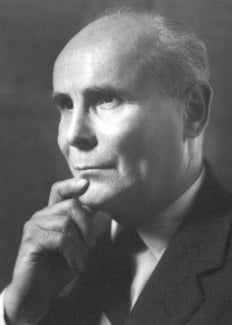André F. Cournand
Biographical

André Frédéric Cournand was born in Paris on 24th September, 1895, the second of the four children of Jules Cournand, a stomatologist, and his wife Marguérite Weber.
He received his early education to secondary school level at the Lycée Condorcet, and obtained his bachelor’s degree at the Faculté des Lettres of the Sorbonne in 1913, taking the Diploma of Physics, Chemistry, and Biology of the Faculté des Sciences, the following year.
The medical studies, begun in 1914, were interrupted by his volunteering for service in the French Army. From 1915 to 1918 he was successively a private in an infantry regiment, a corpsman, and a battalion surgeon, and he was awarded the Croix de Guerre with three bronze stars.
On leaving the Army at the end of the First World War, he resumed his medical studies and became Interne des Hôpitaux de Paris in 1925. During the next few years he gained much clinical experience: in internal medicine under de Massary and Professor Achard; in chest diseases under Rist; in pediatrics under Professor Debré, and in neurology under Professor Guillain. He published a thesis submitted on Acute Disseminated Sclerosis, and was awarded the M.D. degree of the Faculté de Médecine de Paris in May, 1930.
Anxious to study and work in the United States of America, Cournand secured a residency in the Tuberculosis (later Chest) Service of the Columbia University Division at Bellevue Hospital, New York, which was directed by Professors James Alexander Miller and J. Burns Amberson. Offered the opportunity to become Chief Resident of this service and to conduct, under the guidance of D. W. Richards, research on the physiology and physiopathology of respiration, he decided to settle in the United States, and became an American citizen in 1941. His work in collaboration with Richards, which earned them Nobel Prizes, has extended over a quarter of a century.
Cournand’s work in the field of full-time medical investigation has been performed exclusively in the Chest Service of Bellevue Hospital, where he is a Visiting Physician. In the hospital’s Cardio-Pulmonary Laboratory, many clinical investigators from the United States and other countries were trained in and worked on the development of physiologic methods of exploration of the cardiopulmonary system. Cournand’s academic appointments at Columbia University College of Physicians and Surgeons have ranged from Instructor in Medicine (1934) to Professor of Medicine (1951).
Professor Cournand has served on the Editorial Boards of many medical and physiological publications: Circulation, Physiological Reviews, The American Journal of Physiology, and also Journal de Physiologie and Revue Française d’Etúdes Cliniques et Biologiques. During the Second World War he held the post of responsible investigator of the Office of Scientific and Research Developments and was a consultant of the Chemical Warfare Service. He was the Chairman of the Cardiovascular Study Section of the National Heart Institute of the Public Health Service (1956-1959).
André Cournand is a member of the American Physiological Society, the Association of American Physicians, the American Clinical and Climatological Association, and the American Association of Thoracic Surgery. and also, in 1958, of the National Academy of Sciences of the United State of America. His foreign associations include Associé Etranger de l’Académie Nationale de Médecine, Paris (1960); honorary membership of the Swedish Society for Internal Medicine, the Swedish Cardiac Society, the British Cardiac Society, and the Societé Médicale des Hôpitaux de Paris. He is also Foreign Corresponding Member of the Académie Royale de Médecine de Belgique and a Membre Associé Etranger de l’Académie des Sciences de l’Institut de France.
In 1950, Professor Cournand was appointed Lecturer of the Harvey Society (of which he was elected President 1960-1961), and of the Royal College of Physicians and Surgeons of Canada (1952), and was selected by the Association des Médecins de Langue Française in 1951 to present a report on the physiopathology of chronic cardiac failure. He gave the Einthoven Memorial Lecture at the University of Leiden (Holland) in 1958, and the Dr. Albert Wanderer Gedenkvorlesung at the University of Berne (Switzerland) in 1962. Many seats of medical research have recognized his work, and he has received the Anders Retzius Silver Medal of the Swedish Society for Internal Medicine (1946), the Lasker Award of the United States Public Health Association (1949), the John Philipps Memorial Award of the American College of Physicians (1952), the Gold Medal of the Académie Royale de Médecine de Belgique and of the Académie Nationale de Médecine, Paris (1956). He was elected Doctor (honoris causa) of the Universities of Strasbourg (1957), Lyon (1958), Brussels (1959), Pisa (1961), and D.Sc. of the University of Birmingham (1961). He is Advisor to the Délégué Général de la Recherche Scientifique et Technique of the French Government since 1958, and is Officier de la Légion d’Honneur and Commandeur des Palmes Académiques.
As a young man Cournand was a sports enthusiast, playing both soccer and tennis, and he also took up high-mountain climbing. He was formerly a member of the G.H.M. of the Club Alpin Français, and is a member of the American Alpine Club.
Cournand was married to the former Sibylle Blumer, who died in 1959; she was the widow of Birel Rosset, and he had adopted her son Pierre Birel Rosset-Cournand who was killed in action in France in 1944 after a brilliant military career. Their three daughters are Muriel (Mme. J. F.Jaeger) who lives in Paris; Marie-Eve (Mrs. Norman Stewart Walker) living in New York; and Marie-Claire.
This autobiography/biography was written at the time of the award and first published in the book series Les Prix Nobel. It was later edited and republished in Nobel Lectures. To cite this document, always state the source as shown above.
André F. Cournand died on February 19, 1988.
Nobel Prizes and laureates
Six prizes were awarded for achievements that have conferred the greatest benefit to humankind. The 14 laureates' work and discoveries range from quantum tunnelling to promoting democratic rights.
See them all presented here.
